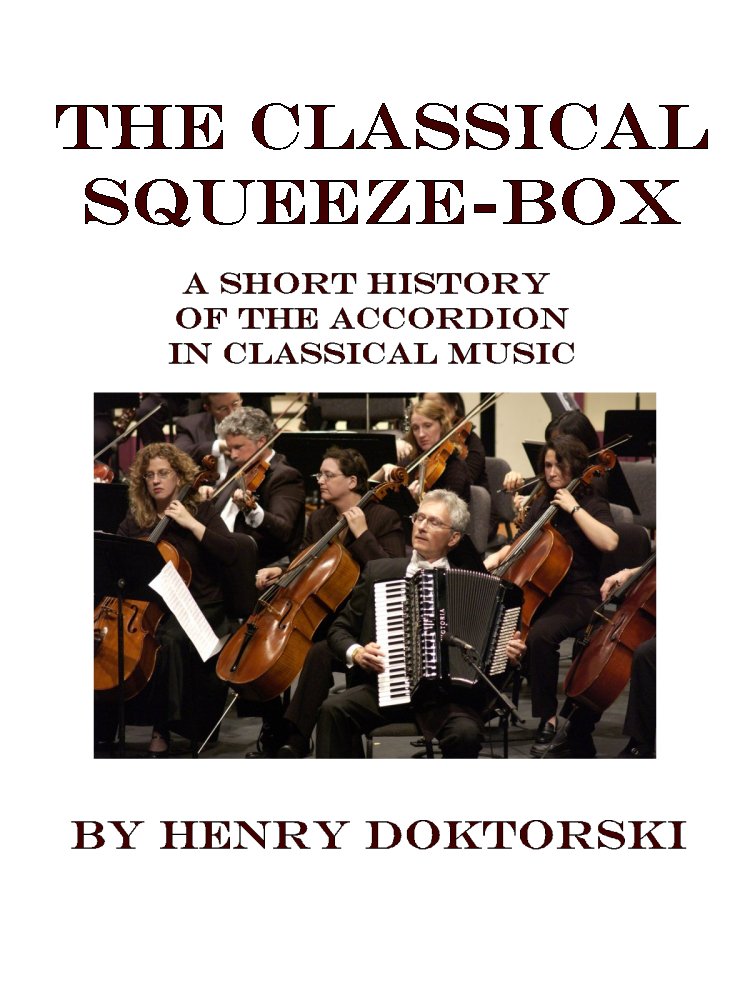The Classical Squeeze-Box
by Henry Doktorski

Originally published in the British academic journal Musical Performance (Vol. 3, parts 2-4: 1998).
Summary
The accordion and its relatives—the concertina, bandoneón and bayan—are not commonly associated with classical music. Yet hundreds of classical composers, from Romantic masters, including Tchaikovsky, to composers of the contemporary avant garde such as Del Tredici, Schafer and Kagel, have included handheld bellows-driven free-reed instruments in their compositions.
Henry’s treatise traces the birth of the accordion and its subsequent historical development as a concert instrument. Major nineteenth- and twentieth-century composers for the accordion are mentioned and several works discussed in detail, showing both serious and more humorous uses of the instrument. The article also considers the history and role of the classical concertina, the classical free-bass accordion, the classical bandoneón and the classical bayan. The author concludes by a discussion of the future of the accordion, and includes a select list of composers for accordion and bayan.
The Classical Squeezebox: A Short History of the Accordion in Classical Music will be a truly treasured addition to the library of the discriminating accordion aficionado and music history scholar.
11 Sections
Introduction
Birth of the Accordion
The Classical Concertina and Giulio Regondi
The Classical Accordion as a Folk and Comic Symbol
The Classical Accordion—in its “Serious” Guise
The Classical Free-Bass Accordion
The Classical Bandoneón and Piazzolla
The Classical Bayan
The Crisis of the Classical Squeezebox
The Future of the Classical Squeezebox
Appendix: Selected Accordion Composers (since 1979)
8 Illustrations and Photographs
Cyrill Demian’s original accordion
Kirsnik’s harmonica
Buschmann’s handharmonika
Wheatstone’s concertina
Mirwald’s button accordion
Dallape’s piano accordion
Modern piano accordion
Bandoneón
Specifications
Size: 11 x 8.5 inches
44 pages
Pamphlet
Endorsement by Maestro Anthony Galla-Rini
There are very few books about the history of the accordion and there are even fewer which focus specifically on the history of the accordion in classical music. The present work fills a real void in musicological literature; to my knowledge it is the only treatise in English (or any other language, for that matter) which traces the development of all the free-reed instruments in the repertoire of classical music beginning with their origins in the nineteenth century (and earlier) until the present time.
The Classical Squeezebox is a comprehensive work; it combines a great attention to detail with a broad international and historical perspective. The author’s scholarship is admirable, his viewpoints are sometimes surprising—yet always enlightening and refreshing—and I am sure that anyone who reads the complete dissertation will agree with me on this point.
I am truly impressed with The Classical Squeezebox and I sincerely congratulate Henry Doktorski for his significant literary contribution to the music world, which, I believe, will go far in dispelling the lamentable ignorance about the rich history of the classical accordion by music lovers in general and musicologists in particular.
To purchase this item, contact Henry at:
